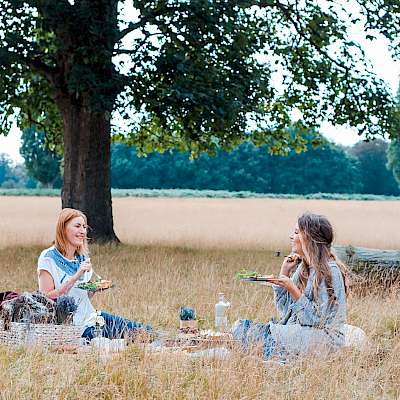Eating Better Trustee Duncan Williamson and founder at Nourishing Food Systems looks at the connections between nutrition and nature for our mental wellbeing
A virtuous circle
Our relationships to food, nutrition and nature can all affect our mental health, but it is complex. Brain function and mood are linked to what we eat which relies on a sustainable food system. Our food system relies on a healthy functioning ecosystem. Nature is key to our nutritional needs and benefits our mental health. It’s a virtuous circle.
Some food can make us feel better. We know a Mediterranean diet, high in vegetables, fruit, herbs, wholegrains, cereals, olive oil, seafood, nuts, with some meat, dairy, coffee and sweet treats, has a positive impact on our health, mental and physical.
However there are some groups of foods that have a negative effect on our mental health. The first is foods that prevent the conversion of other foods into nutrients the brain needs, such as too much saturated fat like palm oil; The second is those that trick the brain into releasing chemicals we may be lacking. Ironically these are often the food we associate with making us happy and temporarily altering our mood. Chocolate, alcohol or even cake can have adverse impacts.
It’s not simple enough to say some foods are good, others are bad, it’s all about how much we eat and when. Food can help us in tough times, it can bring back memories of childhood, travelling or happy occasions.
The best thing about less meat and dairy and more plants is that it’s good for the planet, too. We all know we need to eat less of all meat, dairy and processed foods and more whole grains, nuts and veg.
One of the best ways to improve your mood with food, eating with others, has not been possible in recent months. Even setting aside one meal a week to eat with family and friends has proven almost impossible. In future, a simple mood-enhancing goal is to eat more with friends and family.
%20(1).png)
Being with nature
Spending time in open spaces, be it parks, woods, moors or the seaside benefits our physical and mental wellbeing. If you can’t visit open spaces then bringing nature into your home or garden helps. The options are limitless. You can grow chillies or plant some flowers in a window box, go for a wild swim or a run outside or even just being around animals, all can improve your mental health. Nature is everywhere.
It is amazing the list of benefits from interacting with nature. According to Mind, they include: Improving your mood, reducing stress and anger, helping you relax, improving your fitness, helping you make new friends and improving your self-esteem.

One of Eating Better’s founding members, WWF UK, alongside the Mental Health Foundation have produced a guide for everyone that makes the most of the UK’s natural spaces for our mental health. It is called Thriving with Nature and is a great starting point to learn more about how nature is key for our physical and mental wellbeing, as well as our future on this planet.
Picnics - a winning combination
If you want to combine nature, wellbeing and food the simplest way is to have a picnic. Buy or make a selection of dishes, and bring some fresh fruit, vegetables and other foods all built around a healthy, sustainable diet. Grab a rug, call family and friends, and go for a walk outside. Eat, drink, marvel at the world around you and maybe feel a little bit better. The best thing is picnics can take place almost anywhere from forests to hill tops to the seaside. Don’t limit yourself to summer, nature is wonderful all year round, you just might need a jumper.
.jpg)
